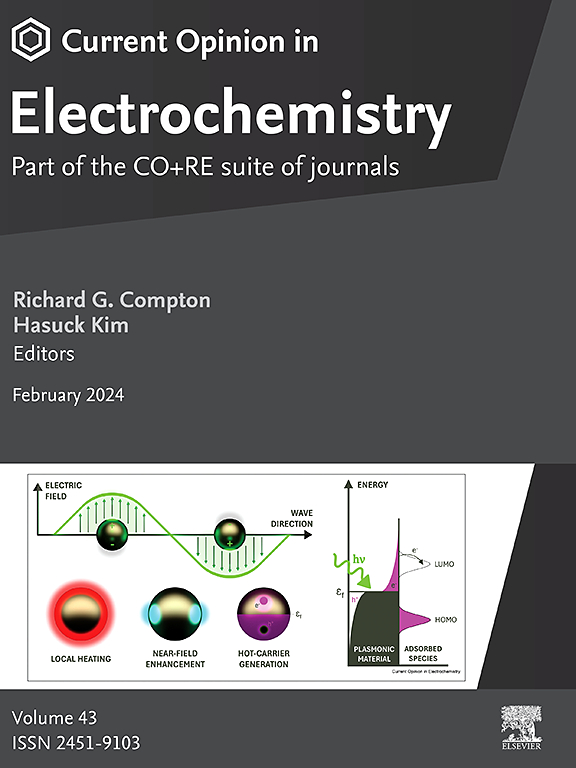Local pH engineering to impact electrocatalysis
IF 6.9
2区 化学
Q1 CHEMISTRY, PHYSICAL
引用次数: 0
Abstract
Local pH refers to the pH gradient developed within the diffusion layer of the electrode, which can deviate significantly from the bulk value due to proton consumption or generation during electrocatalytic reactions. The proton availability is often a thermodynamic or kinetic limiting factor during electrocatalytic reactions involving proton–electron transfer as the determining step. Thus, controlling local pH can effectively impact both reaction selectivity and activity. In this short review, we present recent advances and strategies that emerged to effectively tune the local pH and impact on different electrocatalytic reactions, such as CO2 reduction reaction (CO2RR), electrochemical nitrate reduction (ENR), O2 reduction reaction, (ORR) and ethanol oxidation reaction (EOR). The catalyst engineering approach through microenvironment modification, tuning mass transport conditions by catalyst size and porosity, as well as by pulsed potential electrolysis are the strategies described here.
局部pH工程影响电催化
局部pH是指电极扩散层内形成的pH梯度,在电催化反应过程中,由于质子的消耗或产生,pH梯度可能与本体值有明显偏差。在以质子-电子转移为决定步骤的电催化反应中,质子可用性通常是热力学或动力学的限制因素。因此,控制局部pH值可以有效地影响反应的选择性和活性。在这篇简短的综述中,我们介绍了最近的进展和策略,以有效地调整局部pH值和影响不同的电催化反应,如CO2还原反应(CO2RR),电化学硝酸盐还原(ENR), O2还原反应(ORR)和乙醇氧化反应(EOR)。本文介绍了通过微环境修饰、通过催化剂尺寸和孔隙度调节质量传输条件以及脉冲电位电解的催化剂工程方法。
本文章由计算机程序翻译,如有差异,请以英文原文为准。
求助全文
约1分钟内获得全文
求助全文
来源期刊

Current Opinion in Electrochemistry
Chemistry-Analytical Chemistry
CiteScore
14.00
自引率
5.90%
发文量
272
审稿时长
73 days
期刊介绍:
The development of the Current Opinion journals stemmed from the acknowledgment of the growing challenge for specialists to stay abreast of the expanding volume of information within their field. In Current Opinion in Electrochemistry, they help the reader by providing in a systematic manner:
1.The views of experts on current advances in electrochemistry in a clear and readable form.
2.Evaluations of the most interesting papers, annotated by experts, from the great wealth of original publications.
In the realm of electrochemistry, the subject is divided into 12 themed sections, with each section undergoing an annual review cycle:
• Bioelectrochemistry • Electrocatalysis • Electrochemical Materials and Engineering • Energy Storage: Batteries and Supercapacitors • Energy Transformation • Environmental Electrochemistry • Fundamental & Theoretical Electrochemistry • Innovative Methods in Electrochemistry • Organic & Molecular Electrochemistry • Physical & Nano-Electrochemistry • Sensors & Bio-sensors •
 求助内容:
求助内容: 应助结果提醒方式:
应助结果提醒方式:


